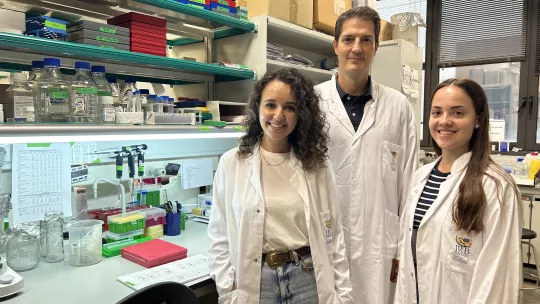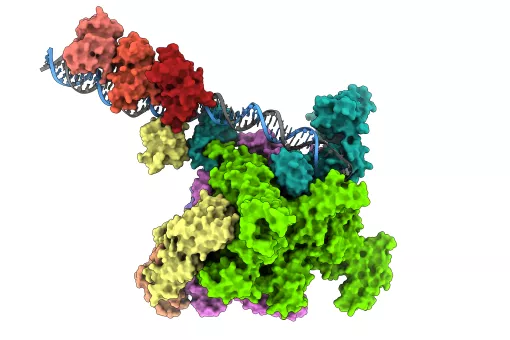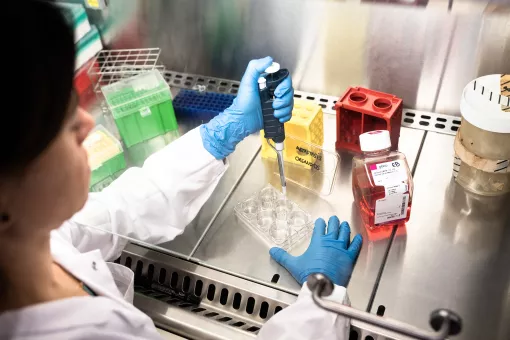Images
- The MAF protein interacts with the estrogen receptor, alters its function, and promotes the spread of cancer.
- The KDM1A enzyme plays a fundamental role in the epigenetic remodelling that facilitates the function of pro-metastatic genes.
- The work carried out in Dr. Roger Gomis Lab at IRB Barcelona has been published in the journal Nature Cell Biology.
Breast cancer is the most common form of cancer among women, with more than 2 million new cases diagnosed each year. In cases where the tumour remains localised in the breast, survival rates are remarkably high, at around 90%. However, the spread of cancer cells beyond breast tissue and the formation of metastases in other organs dramatically worsens the prognosis and poses significant challenges. Previous research has already linked the MAF protein to an increased risk of developing metastasis, but the reasons for this connection remained unclear.
A team from IRB Barcelona led by ICREA researcher Dr. Roger Gomis has revealed the mechanism by which the MAF protein increases the risk of metastasis in breast cancer patients. This finding is a crucial step in understanding the molecular basis of metastasis and has relevant clinical implications for treatment.
The research team has detailed in the journal Nature Cell Biology how the MAF protein interacts with the estrogen receptor, a key element in the development of breast cancer, modifying its structure. This interaction leads to DNA restructuring, which allows the activation of genes that favour metastasis, particularly in response to estrogen. These findings imply that patients with high levels of MAF protein have a greater risk of developing metastasis.
This study opens up the possibility of preventing metastasis by impeding the activation of pro-metastatic through the inhibition of the KDM1A molecule, which is responsible for DNA restructuring. This offers new perspectives in the treatment of breast cancer. The study was carried out in cultured cells and animal models of the disease, and it was validated in patient samples.
The research has been supported by the "la Caixa" Foundation through the 2018 Health Call. The project has also received funding by the Spanish Association Against Cancer, the FERO Foundation, the BBVA Foundation and the Spanish Ministry of Science and Innovation. The project has also been supported by Mrs. Carme Segura Capellades, who donates generously to cancer research at IRB Barcelona.
Crucial discovery for young and premenopausal patients
Previous studies by the same laboratory had already established a connection between increased MAF protein levels and resistance to "bisphosphonate" treatment used to prevent breast cancer metastasis to bone.
The detection of high levels of MAF can therefore predict the risk of metastasis, as well as distinguish between breast cancer patients who may benefit from bisphosphonate treatment from those for whom this treatment is inappropriate. This information is particularly crucial for young patients. Treatments aimed at the site of bone metastasis can, in some cases, divert metastasis to other organs, which has a negative impact on the overall survival of patients.
"This finding is a critical step in understanding how breast cancer spreads and opens up new therapeutic options for the 20% of patients who cannot benefit from bisphosphonate treatment," explains Dr. Gomis, head of the Growth Control and Cancer Metastasis laboratory at IRB Barcelona and also a group leader at the Cancer CIBER (CIBERONC).
The MAF Test: a diagnostic tool that is now available
The research carried out in Dr. Gomis' lab has led to the development of the MAF Test, a predictive tool available for breast cancer patients. This diagnostic test has been developed by Inbiomotion, a spin-off from IRB Barcelona and ICREA founded in 2011, and is available in Spain through PALEX Medical.
The MAF Test allows the identification of breast cancer patients with a greater risk of developing metastasis and facilitates informed decisions by oncologists about the most appropriate treatment for each case.
A drug currently in clinical trials could benefit these patients
An inhibitor of the element that researchers have identified as key in the metastatic drift of breast cancer, namely the KDM1A protein, has already been identified and is currently in clinical trials to validate its effectiveness and safety. This inhibitor and related trials are independent of the findings published today. However, if this potential drug is confirmed to be effective, it could offer significant benefits for patients with elevated MAF levels by helping to prevent the development of metastases.
The first authors of the study are Dr. Alicia Llorente, who started this work during her doctoral studies, Dr. Teresa Blasco, who also signs as responsible for the publication, together with Dr. Gomis and Irene Espuny. All three work in Dr. Gomis' laboratory. The research was carried out in collaboration with the laboratories headed by Dr. Luciano Di Croce, at the Center for Genomic Regulation, Dr. Alexandra Avgustinova at IRB Barcelona and the Institut de Recerca Sant Joan de Deu, and Dr. Ingunn Holen, at the University of Sheffield. The study also involved the groups led by Dr. Antoni Riera and Dr. Freddy Monteiro (both at IRB Barcelona), and Dr. Mariona Graupera, at the Josep Carreras Leukemia Research Institute.
Related article:
MAF amplification licenses ER through epigenetic remodeling to drive breast cancer metastasis
Alicia Llorente, María Teresa Blasco, Irene Espuny, Marc Guiu, Cecilia Ballaré, Enrique Blanco, Adrià Caballé, Anna Bellmunt, Fernando Salvador, Andrea Morales, Marc Nuñez, Guillem Loren, Francesca Imbastari, Marta Fidalgo, Cristina Figueras-Puig, Patrizia Gibler, Mariona Graupera, Freddy Monteiro, Antoni Riera, Ingunn Holen, Alexandra Avgustinova, Luciano Di Croce & Roger R. Gomis.
Nature Cell Biology (2023) DOI: 10.1038/s41556-023-01281-y
About IRB Barcelona
The Institute for Research in Biomedicine (IRB Barcelona) pursues a society free of disease. To this end, it conducts multidisciplinary research of excellence to cure cancer and other diseases linked to ageing. It establishes technology transfer agreements with the pharmaceutical industry and major hospitals to bring research results closer to society, and organises a range of science outreach activities to engage the public in an open dialogue. IRB Barcelona is an international centre that hosts 400 researchers and more than 30 nationalities. Recognised as a Severo Ochoa Centre of Excellence since 2011, IRB Barcelona is a CERCA centre and member of the Barcelona Institute of Science and Technology (BIST).























